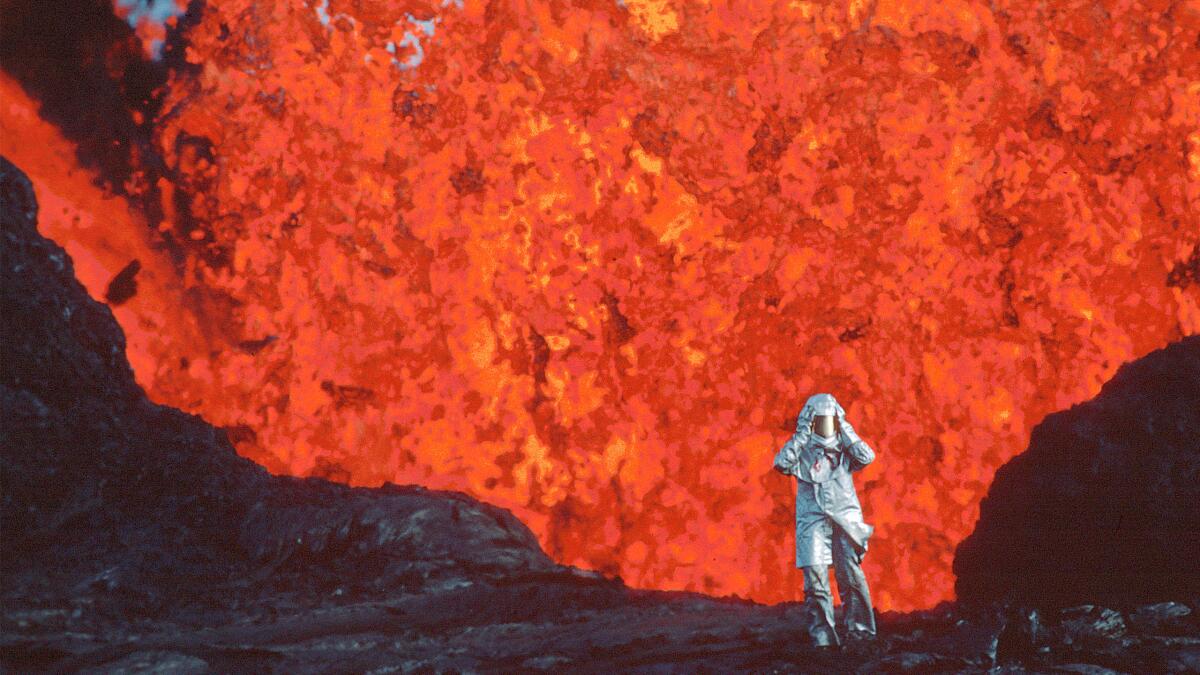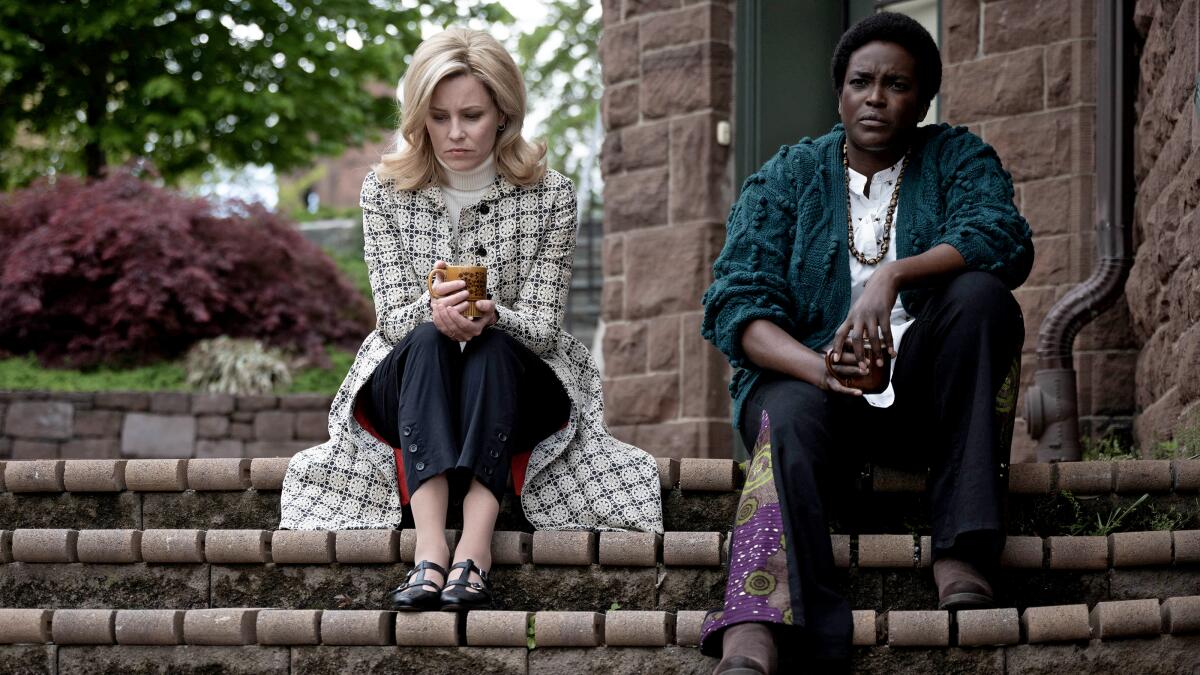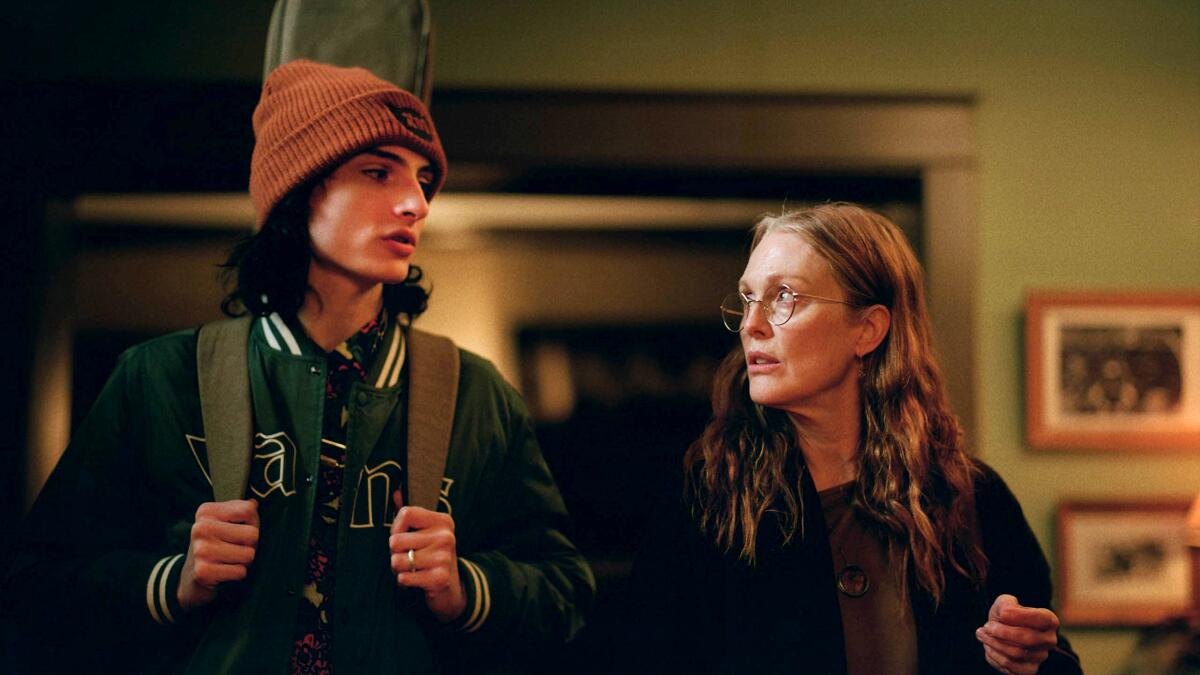Sex positivity, abortion rights and volcanic eruptions among seven early gems at a virtual Sundance

- Share via
Every public screening at the Sundance Film Festival is preceded by a land acknowledgment, recognizing the Shoshone, Paiute, Goshute and Ute tribes that have long stewarded the ground on which this annual event takes place. This tradition continues even now, as the COVID-19 pandemic has temporarily transformed America’s most significant showcase for new independent cinema into an online-only event. Each movie that pops up in your Sundance screening app is prefaced by a video acknowledgment — a roughly two-minute montage that urges you to remember the land’s traditional stewards and reflect on the human and environmental destruction wrought by their successors.
Indigenous representation and environmental advocacy have long been core principles for Sundance, now in its 38th year. But the emphasis on land — on a terrestrial, material reality that we overlook at our peril — carries a particular poignancy in these strange times.
This is the second January in a row that the movie-loving, buzz-generating crowds have stayed away from snowy Park City, Utah, and logged on from home instead to sample an abundance of new work. It’s gratifying to be able to experience Sundance in any form. But for those of us who hunger for this festival in all its pre-pandemic glory, there are pleasures — and yes, headaches and frustrations — that no couch-potato festival experience will ever replicate.

More than a lot of events of its kind, Sundance has an overpowering sense of place, a physical and atmospheric intensity that has a way of seeping through your layers of winter wear. There’s the bracing chill that envelops you as you step out of the Eccles Theatre, the high-school auditorium that serves as the festival’s largest venue, and the sensation of being jostled to and fro on the crowded shuttle bus bearing you to your next destination. And there’s also the palpable warmth that fills a theater as hundreds of festivalgoers shed their beanies and parkas and huddle together in the dark, ready to be swept away.
Under normal circumstances, those moviegoers might have been greeted by actors like Jesse Eisenberg and Julianne Moore at the first screening of “When You Finish Saving the World,” one of the festival’s early high-profile premieres. This time, Eisenberg is a strictly behind-the-camera presence: He wrote and directed this often bitingly funny drama, which probes the competing strains of delusion and narcissism that surface between Evelyn (Moore), who manages a shelter for domestic abuse survivors, and Ziggy (Finn Wolfhard), her fame-seeking teenage son. While their clash of interests, worldviews and political ideals (or lack thereof) is too painfully specific to be written off as generational, Eisenberg has clearly absorbed an acerbic lesson or two from his own filmmaking elders, Noah Baumbach not least among them.
“When You Finish Saving the World,” a forthcoming A24 release, hit the viewing platform on Thursday, the festival’s opening night; so did the red-hot geysers of “Fire of Love,” Sara Dosa’s gorgeous portrait of the late French scientists Katia and Maurice Krafft, who spent their lives (and met their deaths) studying and filming volcanic eruptions. An early standout of the festival’s American documentary competition (and the beneficiary of one of its earliest splashy acquisitions, by National Geographic Documentary Films), the movie makes the Kraffts’ magnificent obsession your own with its jaw-dropping eruption footage, much of it shot by the Kraffts themselves during a career that spanned the ’70s, ’80s and early ’90s. Full of Herzogian awe at the beauty and pitiless power of Mother Nature, it’s a harrowing, captivating reminder that lava conquers all. (It also made for especially timely viewing mere days after the devastating Hunga Tonga-Hunga Ha’apai eruption in the South Pacific.)

One way to think of “Fire of Love,” then, is as its own kind of land acknowledgment, one that asks us to consider the Earth and reckon with its great and terrible mysteries. Something similar might be said about Alon Schwarz’s alternately chilling and blood-boiling documentary “Tantura,” which digs into the history of the 1948 Arab-Israeli War and the violently contested tragedy that befell the Palestinian fishing village of the title. A controversial, since-suppressed 1998 thesis by a University of Haifa researcher concluded that Israeli soldiers had massacred 200 Arabs in Tantura and buried the bodies in a mass grave — an allegation that Schwarz explores with a confrontational directness that recalls “The Act of Killing.” The result is both a study in historical amnesia and a kind of epistemological detective story, in which the grim truth is as hard to refute as it is hard to prove.
Excavations of a less gruesome kind factor into “A Love Song,” Max Walker-Silverman’s achingly tender drama of lost loves, buried dreams and second chances. Twelve years after she wowed Sundance audiences in Debra Granik’s “Winter’s Bone,” the great Dale Dickey gets the too-rare gift of a leading role in this story about a woman who parks her trailer at a remote Colorado campsite, where she waits and waits for a childhood sweetheart (Wes Studi) to come knocking. Here too the land exerts a strange and almost primordial power, with its flat grounds, rocky slopes and life-sustaining fishing holes, though Walker-Silverman’s camera finds equally expressive vistas in his stars’ magnificent weather-beaten visages.
Dickey’s lonely widow may not have much in common with Emma Thompson’s lonely widow in “Good Luck to You, Leo Grande,” beyond a welcome refusal to let age determine their romantic and sexual limits. In this wondrously intimate hotel-chamber piece, directed by Sophie Hyde from a script by Katy Brand, that initiative spurs Nancy (Thompson) to book a sex worker (the charming Daryl McCormack) for several sessions, during which he eases her past her reservations and anxieties and she teases out his own personal history. There’s a suitably erotic rhythm to their conversations — it’s all about give and take, back and forth, the satisfaction of curiosity, the delineation and occasional transgression of boundaries — and the beautifully paired Thompson and McCormack commit themselves fully to a movie that wears its sex-positivity on its sleeve.

“Good Luck to You, Leo Grande” implicitly critiques a present-day culture that seeks to police, confine and even deny the possibility of women’s pleasure. That places it in pointed conversation with at least two other female-directed, female-centric films, “Call Jane” and “Happening,” which are set in the ’60s but could scarcely be more of the moment. In “Call Jane,” Phyllis Nagy’s subtly accomplished feature directing debut, a terrific Elizabeth Banks stars as a suburban Chicago housewife who seeks help from — and ultimately joins — the women of Jane, an underground collective devoted to providing abortions at a time when the procedure was still illegal. Nagy, who so adroitly distilled the essence of 1950s repression in her Oscar-nominated screenplay for “Carol,” here dramatizes the steady cracking of those confines more than a decade later.
Those seeking to learn more about the story can watch Tia Lessin and Emma Pildes’ documentary “The Janes,” which will premiere at Sundance this week and promises to be depressingly relevant viewing at a moment when Roe vs. Wade (which just passed its 49th anniversary) has never been more endangered. But as the tense, coiled French drama “Happening” reminds us, the need for access to safe, legal abortions is scarcely limited to this country alone. It follows a 1960s student named Anne (the remarkable Anamaria Vartolomei) who seeks an abortion and is stymied at every turn by men and women alike; the sisterly solidarity of something like the Jane collective could hardly be more out of reach.
Anne’s is a terribly lonely journey, one that the film’s director and co-writer, Audrey Diwan, charts with an eye that’s by turns tough and compassionate, tactful and unsparing. “Happening” won the top prize at fall’s Venice International Film Festival, beating out much-vaunted awards contenders including “The Power of the Dog,” “The Lost Daughter” and “Spencer.” Set to be released May 6 by IFC Films, it’s a knockout wherever it plays, in cinemas physical or virtual, on screens big or small.
More to Read
Only good movies
Get the Indie Focus newsletter, Mark Olsen's weekly guide to the world of cinema.
You may occasionally receive promotional content from the Los Angeles Times.











